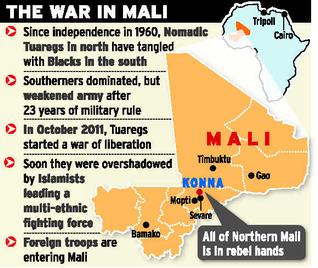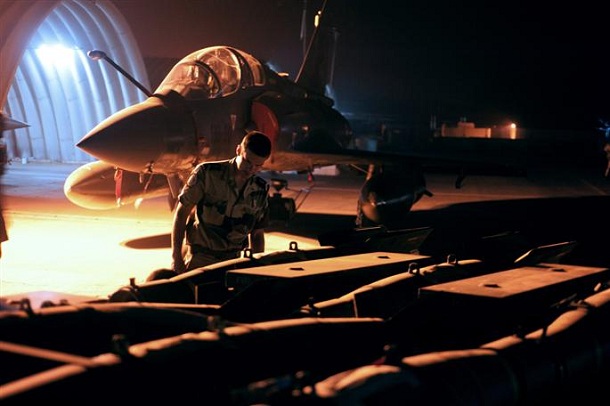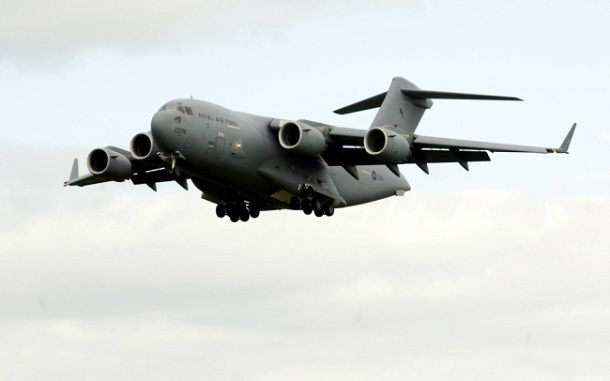France has engaged airstrikes in northern Mali to clear the way for an intervention force concentrating on the capital Bamako.
On the fourth day of the French military incursion the armed forces widened their bombing campaign to encompass central Mali, to target new threats. French Defense Minister, Jean-Yves Le Drian said that Islamist rebels had seized the town of Diabaly in central Mali on Monday, overcoming the Malian government forces stationed there.
France’s Rafale fighters bombed out Islamists’ strongholds in the north near the region’s main city of Gao on Sunday, causing the militants to flee, reports AFP. The French Air Force also eliminated arms stockpiles and fuel reserves belonging to Al-Qaeda-linked Ansar Dine (Defenders of Faith), MUJWA and AQIM militant groups and attacked extremists’ bases on the border with Mauritania using 250kg bombs.
Locals welcomed the actions of French Air Force which stopped the nine-month rule of the Islamists and now expect the Malian army’s return into the region to prevent militants from coming back. Reportedly, the Malian army has already made significant gains, recapturing the towns of Douentza and Konna.
The office of French President Francois Hollande announced that cabinet is holding a meeting on Monday morning on the Mali crisis. The French mission in the UN has informed that the UN Security Council will also discuss the situation in Mali later on Monday.
Separately, the EU stated that it intends to accelerate preparations to send in military trainers to strengthen the Malian army. At the same time, spokesperson Michael Mann told press that the EU had no intention of assigning the military trainers a combat role when they arrive in Mali towards the end of February.
French Foreign Minister Laurent Fabius has assured that Islamists in Mali have already been “stopped” and “taking care” of terrorist groups in the country is “a question of weeks.” He also informed that the assault on Islamist compounds on Sunday has become possible as Algeria finally opened its aerospace to French Air Force operations despite previously opposing French interference into Mali’s affairs.
Still, the French authorities have acknowledged that encountered Islamist extremists in Mali are well-trained and armed with advanced weapons, something that has not been expected. On Saturday the militants wounded a helicopter pilot who later died in hospital, becoming France’s only confirmed combat fatality to the moment.
France has still not forgotten its “great colonial past” in Africa and Asia and the operation in Mali, a former French colony (1892-1960), is yet another proof to that fact, told RT political writer and journalist Barry Lando. He said France will be stuck in the operation for longer than it expects and Paris will after all have to negotiate with the rebels.
“The French do not know what their objectives [in Mali] are, how long it is going to go on,” claims Lando. The journalist points out that northern Mali is comparable to the size of France itself, questioning “a few hundred” French troops’ capability to track down the Islamists on such a vast territory that the militants call home and know all too well.
“It is a potentially huge involvement, a very long task. In the end what you are going to do is to negotiate with these people, this is the only way out and I think this is how it is going to end,” predicted Lando.
Following a military coup in Mali in March 2012, Islamists used the destabilized situation in the country to gain control of the northern part of Mali with the help of nomadic Tuareg tribes.
The use of the international force in Mali to help the country’s government regain control of the northern territories was authorized by the UN Security Council in December. Resolution 2085 authorizes the deployment of 3,300 African-led international troops. The Economic Community of West African States (ECOWAS) is expected to hold an extraordinary summit in Cote d’Ivoire’s capital, Abidjan, on Wednesday.
African nations Burkina Faso, Niger, Senegal and Togo promised to contribute 500 troops each, whereas Benin pledged to send 300 service personnel. The African troops  that will start to arrive next Sunday will be going under command of the Nigerian General Shehu Abdulkadir.
that will start to arrive next Sunday will be going under command of the Nigerian General Shehu Abdulkadir.
France has already deployed some 550 troops to Mali under ‘Operation Serval’. The contingent’s commander, Colonel Paul Geze, has announced that French task force’s primary aim is to protect the 6,000 expat community in the capital, Bamako. Another task group will be deployed in the town of Mopti, about 500km to the north of the capital.
France Mali Intervention:Britain is also giving France logistical support, delivering military and medical supplies to Mali.
Britain has announced it will provide France with logistical support during its Mali intervention as French forces stepped up airstrikes against Islamist militants fighting government troops in the North African country.
The British prime minister has welcomed France’s decision to intervene in the North African country to help the Malian army halt a rebel advance towards the capital Bamako.
“The Prime Minister has agreed that the UK will provide logistical military assistance to help transport foreign troops and equipment quickly to Mali,” David Cameron’s office said in a statement on Saturday, adding that London is not going to deploy British personnel in a combat role.
Downing Street said two military transport planes would be deployed, AFP says.
Over 100 Islamist militants have been killed as Malian troops backed by the French military fought for control of the strategic town of Konna.
Meanwhile, Paris announced on Saturday that a French pilot had been killed in an air raid over Konna. “During this intense combat, one of our pilots… was fatally wounded,” French Defense Minister Jean-Yves Le Drian said in a statement. The pilot was wounded during the operation and later died in hospital.
This comes just two days after France sent hundreds of troops to its former colony. The West African regional bloc ECOWAS, will begin sending troops to Mali on Monday.
French airstrikes overnight pushed back Islamist rebels from Konna and destroyed a rebel command center, Le Drian said.
The deployment of French troops has been met with anger from Islamist group Ansar Dine, which said the move will have “consequences for French citizens in the Muslim world.” Ansar Dine is fighting on the frontline of the battle of Konna.
“We are actually in Konna for the jihad [holy war],” an Ansar Dine spokesperson told AFP on Friday.
French President Francois Hollande says the country will raise its domestic terror threat level as a result of the military operations. He promised to increase protection at public buildings and transportation networks.
France decided to take military action after a plea from Mali’s president, and says the intervention will last as long as necessary. However, many critics say France may have had its own motivations for deploying troops in the country.
“There is that much at stake financially and strategically in Mali. But on the other hand this is the sort of intervention that could drag on for very long time. I think what triggered it was the move by the Islamist rebels towards Bamako, which is the capital where most of the French citizens are.Most of them are located at the southern end of the country and I think Hollande felt he had to do something to protect them.” France-based independent journalist Robert Harneis told RT.
On Thursday, the UN Security Council called for “rapid deployment” of international forces in Mali to combat the Islamist militants in the north of the country.
Given the latest developments in the West African country, the members of the UNSC “expressed their determination to pursue the full implementation” of its resolutions on Mali, in particular Resolution 2085, adopted in December, which authorizes the deployment of over 3,000 African-led international troops.
The support force approved by the UN had not been expected to be deployed until September 2013.
Ansar Dine and Mujao have controlled most of northern Mali since last April. They formed an alliance with Tuareg rebels following a military coup in March.
However, their alliance quickly collapsed, with the Islamists capturing the area’s urban centers and marginalizing the Tuareg rebels.
The Islamists have been accused of war crimes and attempting to impose strict Sharia law throughout the region, harboring fears that the area could soon become a hub for al-Qaeda linked militants.
[adrotate banner=”33″]



